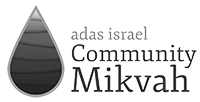These Waters Are for Softening
by Allison Goldman, Mikveh Guide at the American Jewish University
When people come to the mikveh, they often bring with them a language of “cleansing” or of “purification.” It’s clear why one might see the waters in this way – we bathe, after all, to cleanse ourselves; and when we are commanded by the Torah to immerse in a mikveh, the text references ritual purity.
This language, however, can give the wrong impression about the essence of these rituals. If we think about the uses of a mikveh – kashering plates, initiating converts, preparing for holidays, celebrating a major life transition, and marking the return of marital relations between husband and wife – it becomes clear that the role of the mikveh is not exactly to cleanse, but to prepare and guide us in transition from one way of being to another.
In my role as a mikveh guide at the community mikveh of the American Jewish University, I have the great privilege of witnessing mikveh rituals in all their variety. We have people coming in to convert, to prepare for an upcoming wedding, to mark a major milestone like a bar mitzvah or retirement, to heal from the pain of losing a parent or child, or to process the grief of divorce. We have men come in after their partners give birth, to mark the transition into fatherhood. Others come to immerse simply to help their hearts open to love.
Mikveh, clearly, is about transition. As outlined in the mikveh guidebook published by Mayyim Hayyim, our tradition actually teaches that the waters of the mikveh are not meant to wash anything away. They are not meant to penetrate a person or to change anything about who you are. They are only meant to soften you: to make it easier to change, and to move from one state of being to another.
We exist in this world as mind, body, and spirit, but so often, we can get trapped in our minds. This is why our tradition offers us embodied rituals, like wearing tzitzit, wrapping tefillin, eating specific foods, and coming to mikveh. We do these things so that we can get out of our minds and into our bodies – so that we can not just think, but actually feel in our bodies that we are connected to the eternal, that we are bound by this tradition, that we are immersed in each holiday, and that, at any moment in our lives, we can begin again.
The waters of the mikveh are sometimes described as a womb. When a person is immersed within the waters, they are suspended for just a moment, and totally embraced by the divine mystery of the universe. Through mikveh, we have the opportunity to connect with our bodies and, in that stillness, to realize that our lives are constantly in motion.
When we come to the mikveh to mark a moment, we immerse ourselves within a deep rooted intention, and make it easier to grow and change. These waters are for softening.

Allison Goldman is a Mikveh Attendant at the Community Mikveh at the American Jewish University in Los Angeles. She is an active member of her synagogue, IKAR, loves studying Torah, and leads a Rosh Chodesh circle using materials from At the Well.



